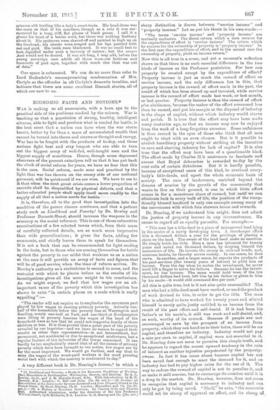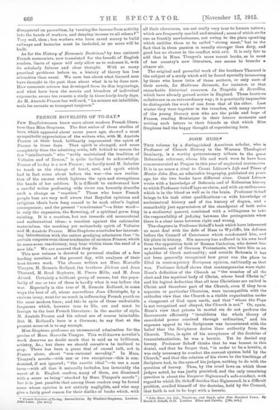ECONOMIC FACTS AND NOTIONS.* WAn. is making us all economists,
with a keen eye to the practical side of the problems studied by the science. War is teaching us that a population of strong, healthy, intelligent citizens, able to fight and produce what is needed for battle, is the best asset that a nation can have when the war storm bursts, better by far than a mass of accumulated wealth that cannot be turned into thews and sinews or thought and energy. War has to be fought with the products of to-day, and those nations fight beet and stay longest who are able to turn out the biggest army of well-fed, well-taught men and the biggest supply of munitions. Hence, though some depressed observers of the present cataclysm tell us that it has put back the clock of social reform for years, we have no fear that this is the case. Social reform, made sane and practical by the light that war has thrown on the seamy side of our national
garment, will be quickened if we are wise. We have to see to it that when the next great crisis comes a lower proportion of recruits shall be disqualified by physical defects, and that a better-educated people shall apply itself more readily to the supply of all that a nation needs for battle.
It is, therefore, all to the good that investigation into the condition of the poorer classes continues, and that a patient study such as Livelihood and Poverty,' by Dr. Bowley and Professor Burnett-Hurst, should increase the weapons in the armoury of the social reformer. This is one of those exhaustive examinations of a few selected towns which, from their mass of carefully collected details, are so much more impressive than wide generalizations ; it gives the facts, adding few comments, and chiefly leaves them to speak for themselves. It is not a book that can be recommended for light reading in the train, but to those who are arming themselves for battle against the poverty in oar midst that weakens us as a nation
at the core it will provide an array of facts and figures that will be of good service when the time of reform arrives. Dr. Bowley's authority as a statistician is second to none, and the restraint with which he places before us the results of his investigations gives all the more weight to his conclusions.
As we might expect, we find that low wages are an all- important cause of the poverty which this investigation has shown to exist "in certain places on a scale which is really appalling "
"The reader will not require us to emphasize the enormous part played by low wages in causing primary poverty. Actually one- half of the households below the poverty line at Warrington and Reading, nearly one-half at York, and one-third at Northampton were living in poverty because the wages of the head of the household were so low that he could not support a family of three children or loss. It is thus proved that a great part of the poverty revealed by our inquiries—and we have no reason to regard their results as other than representative—is not intermittent, but permanent, not accidental or due to exceptional misfortune, but a regular feature of the industries of the towns concerned. It can hardly be too emphatically stated that of all tho causes of primary poverty which have been brought to our notice, low wages are by far the most important. We would go further, and say that to Raise the wages of the worst-paid workers is the most pressing social task with which the country is confronted to-day."
A very different book is Dr. Nearing's Income,' in which a • (I) Livelihood and Poverty a Study in the Economic Conditions of Working- Class Househotde M. Northampton, Warrington, Stanley, and Reading. By A. L. Bosley. Ele.D.. end A. R. Burnett-Burst, B.Sc. With Introduction by R. H. Tawney, BA, London i 0. Bell and Sons. [ Se. ed. not.]—(2) Income: an liramination of the Returns for Services Rendered and,fronz Property Owned in the United Statss, By Scott Nearing, Ph.D. Loudon: Macmillan and Co. [Sc. ad. set.]—(s) A History of Economia Doctrines. By Charles (fide and Charles Riot. Authorized translation, under the direction of the late Professor William Smart, byes. Richards:B.A. Loudon: Ci, 0. Harrap and Co. [lbs. net.]
sharp distinction is drawn between "service income " and "property income." Let us put his thesis in his own words :- "The terms 'service income' and ' property income' are mutually exclusive. The direct return which a man secures for the expenditure of effort is 'service income.' Tho return which. he secures for the ownership of property is 'property income.' In. the first case the expenditure of effort, and in the second case the ownership of property, yield an income return."
Now this is all true in a sense, and yet a moment's reflection shows us that there is no such essential difference in the two kinds of income as the Professor postulates. For how can property be created except by the expenditure of effort P. Property income is just as much the reward of effort as service income, and the only difference lies in this, that property income is the reward of effort made in the past, the result of which has been stored up and invested, while service income is the reward of effort made last week, or last month, or last quarter. Property income is thus the reward of effort plus abstinence, because the maker of the effort consumed less than he earned, and put his margin at the disposal of industry in the shape of capital, without which industry would starve and perish. It is true that the effort may have been made many centuries ago, so that an income may now be enjoyed from the work of a long-forgotten ancestor. Some unfairness is thus caused in the eyes of those who think that all men ought to start with an even chance. But is it possible to abolish hereditary property without striking at the incentive to save and starving industry for lack of capital? It is also true that the effort may have been of a questionable kinds The effort made by Charles II.'s mistresses to fascinate awl amuse that Royal debauchee is rewarded to-day by the rent-rolls of certain dukedoms. But it is hardly possible, because of exceptional cases of this kind, to overhaul every- body's title-deeds, and upset the whole economic basis of society. The case of landowners, enriched beyond the dreams of avarice by the growth of the community that wants to live on their ground, is one in which little effort
comes in for a monstrous share of reward, but until we can eliminate luck in every walk of life, the position of the excep- tionally blessed landlord is only one example among many of the unevenness with which fate showers losses and rewards.
Dr. Nearing, if we understand him aright, does not admit the justice of property income in any circumstances. He seems to regard all as equally parasitic. For example:—
" This man has a title-deed to a piece of unimproved land lying in the centre of a newly developing town. A. storekeeper offers him a thousand dollars a year for the privilege of placing a store on the land. The owner of the land need make no exertion. He simply holds his title. Here a man has laboured for twenty years and saved ton thousand dollars, by denying himself the necessaries of life. He invests the money in railroad bonds, and, someone insists, he thereby serves society. In one sense, he does serve. In another, and a larger sense, he expects the products of his past services (the twenty years of labour) to yield him an income. Flom the day when he makes the investment, he never need lift a finger to serve his fellows. Because he has the invest- ment, lie has income. The same would hold true, if the ten thousand dollars had been left him by his father or given to him by his uncle—it would still command five per cont."
All this is quite true, but is it not also quite reasonable P The man who had a title-deed must have worked, or used the product of work devised to him, in order to get the title. The man. who is admitted to have worked for twenty years and stinted. himself is surely quite justly entitled to an income from the result of his past effort and self-denial. If it had been his father's or his uncle's, it still was work and self-denial, and, as such, worthy of its reward. Because if people are not encouraged to save by the prospect of an income from property, which they can hand on to their heirs, there will he no capital, and therefore no industry. Industry would not pay a rate per cent. to capital, if capital wore not essential to it. Dr. Nearing does not seem to perceive this simple truth, and be appears to regard the recent upward tendency in the rate of interest as another injustice perpetrated by the property- owner. In fact it has come about because capital has not been saved fast enough to meet the demand for it, and so. industry has had to pay higher rates for the use of it. The way to reduce the reward of capital is not to penalize it, and so make it still scarcer, but to encourage its creation until it is a drug in the market. Dr. Nearing, however, does not seem to recognize that capital is necessary to industry and can only bo got by being saved. " Shall," he asks, " the economic world set its stamp of approval on effort, and its stamp oat
disapproval on parasitism, by turning the income from activity into the hands of workers, and denying income to all others P" Very well, then ; but workers who have saved money to build railways and factories must be included, or no more will be built.
As for the History of Economic Doetrines,8 by two eminent French economists, now translated for the benefit of English readers, limits of space will only allow us to welcome it, with its scholarly fulness and clear thought. With so many practical problems before us, a history of theory has lees attraction than usual. We care less about what learned men have thought in the past than about what is to be done now. How economio science has developed from its dim beginnings, and what have been the merits and blunders of individual exponents, seems too remote a study in these hurly-burly days. As H. Anatole France has well said, "La science est infaillible; male lee savants se trompent toujours."







































 Previous page
Previous page